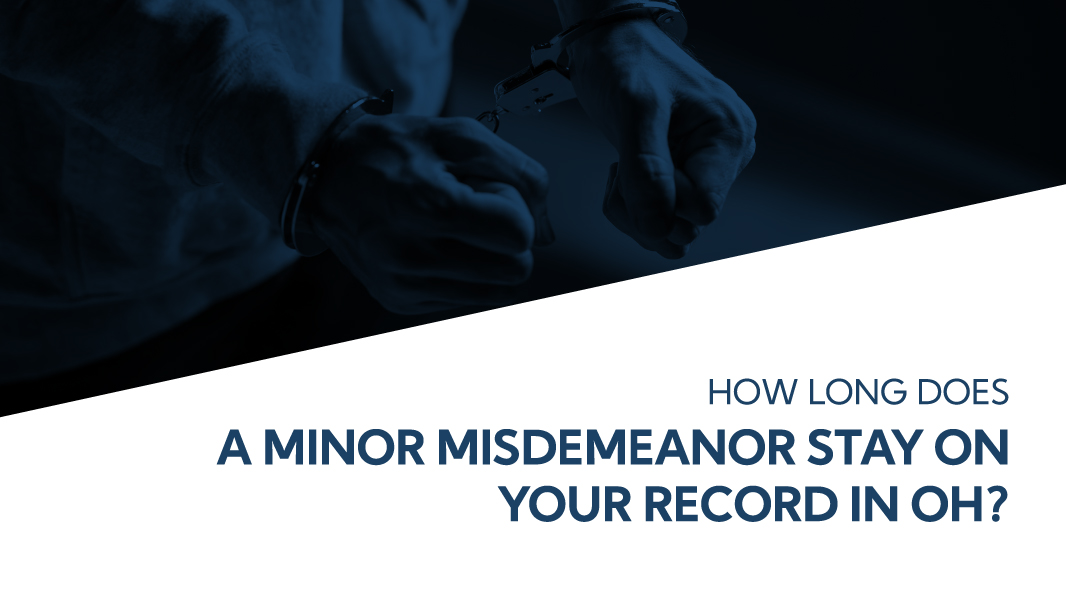
In Ohio, there are two basic types of criminal offenses: misdemeanors and felonies. Misdemeanors are less serious criminal offenses that have a potential sentence of less than one year in jail. A minor misdemeanor is the least serious type of criminal offense, carrying a penalty of no jail time and a fine of up to $150.
Typically, being convicted of a crime will give you a criminal record. Minor misdemeanors are different, in that only some convictions will show up during a criminal background check. For many reasons, it may still make sense to clear your criminal record of minor misdemeanors. One year after the date that the misdemeanor sentence ended, you can apply to have your minor misdemeanor expunged.
At Engel & Martin, we are aggressive advocates for individuals charged with all types of crimes in Ohio. As experienced former prosecutors, we know how the system works – and we put our knowledge to work for our clients. If you have been charged with or convicted of a crime in Ohio, give our law office a call to learn more about how our team of criminal defense attorneys can help you.
How Long Does a Minor Misdemeanor Stay on Your Record?
In Ohio, if you are convicted of a criminal offense, it will not simply “go away” after the passage of time. Instead, if you qualify, you must take affirmative steps to remove a conviction from your criminal record. This includes minor misdemeanors.
Minor misdemeanors include a number of traffic offenses, along with charges for disorderly conduct, public intoxication, drug possession for small amounts of certain substances, and reckless driving. Some minor misdemeanor convictions will show up on a criminal background check, while others will not. For example, under Ohio’s marijuana laws, a minor misdemeanor conviction for possession of a small amount of marijuana does not constitute a criminal record and does not need to be disclosed as a conviction.
Depending on your situation, it may make sense to have a minor misdemeanor conviction removed from your record through expungement. This is a legal process by which you can clear your criminal record – if you meet the eligibility requirements. Expungement is not automatic.
Under Ohio’s expungement laws, a minor misdemeanor may be considered a conviction that can be cleared. Specifically, a minor misdemeanor is a conviction that can be expunged if it involves a violation of:
- Section 4511.19 (OVI)
- Section 4511.251 (street racing)
- Section 4549.02 (failure to stop after an accident on a public road)
- Section 4549.021 (failure to stop after an accident on a nonpublic road)
- Section 4549.03 (failure to stop after an accident involving damage to property)
- Section 4549.042 (sale or possession of a master vehicle key)
- Section 4549.62 (concealing or destroying the identity of a vehicle)
- Sections 4549.41 to 4549.56 (offenses related to vehicle odometers)
- Section 4510.11 (driving under a suspension or a license restriction)
- Section 4510.14 (driving under an OVI suspension)
Other types of minor misdemeanors may not need to be expunged under Ohio law. These laws can be confusing, particularly when it comes to minor misdemeanors. An Ohio expungement attorney can advise you about whether your minor misdemeanor conviction can be cleared.
If you qualify for expungement, then you will need to wait for a period of one year after the final discharge of your conviction to have your record sealed. There is no legal limit on the number of minor misdemeanors that you can have sealed, as long as your total number of convictions falls within the “eligible offender” limits.
How Can I Remove a Minor Misdemeanor from My Ohio Record?
Sealing misdemeanor records through expungement is a way to clean up your criminal record. If your motion for expungement is granted, it will be like you were never convicted at all.
To qualify for expungement, you must meet the eligibility requirements. Broadly, this includes:
- Meeting the definition of an “eligible offender;”
- The appropriate amount of time has passed since the final discharge of your case (minimum of one year for misdemeanors); and
- No pending criminal charges.
These rules surrounding expungements are confusing. If you aren’t sure if you qualify, reach out to an OH criminal defense attorney to schedule a consultation about your case.
If you are eligible for having your record sealed, then you will need to file an application with the local Court of Common Pleas. There are different forms based on what type of record you want to be sealed. There is a $50 filing fee, which may be waived if you cannot afford it.
Once the court receives your application, it will schedule a hearing date. The local prosecutor’s office may either file an objection to your application or may file a “Brief in Response,” which means that they agree that you have met the eligibility requirements. A judge will make the final decision about whether to seal your record after the hearing.
Importantly, sealing your misdemeanor record does not mean that these records will be destroyed. Law enforcement, government officials, and agencies will be able to access your record as part of new criminal investigations. Certain employers, such as daycares, schools, and hospitals, can also see your sealed records, along with financial institutions.
Dealing with a Criminal Record? We Can Help.
If you have been convicted of a criminal offense, it can affect your life for years to come. Getting those records sealed can allow you to get a fresh start. While the expungement process can be challenging, our law office can advise and guide you along the way.
The law firm of Engel & Martin was founded by former prosecutors. We use our deep knowledge of Ohio criminal law to help our clients achieve the best possible outcome. To schedule a consultation with a misdemeanor and traffic offenses attorney in Mason, Ohio, give us a call at 513-445-9600 or fill out our online contact form.
